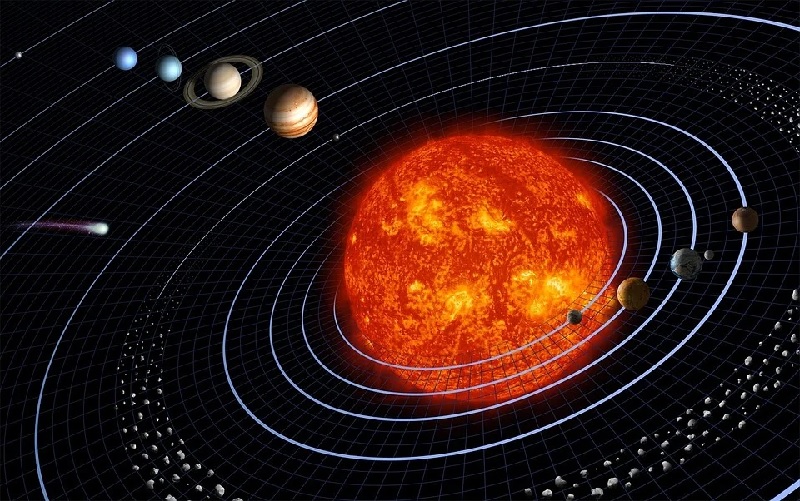What is the Goldilocks Zone?
Written by Nihal Singh Dhingra, a grade 10 student. (originally published in January 2022)
A Goldilock’s zone refers to the zone (area) around a star is that is habitable, mainly because the temperature in this zone is just right- not too hot or not too cold, for water to exist in liquid form, and thus for life to exist…
Written by Nihal Singh Dhingra, a grade 10 student (originally published in January 2022)
A Goldilocks zone refers to the zone (area) around a habitable star where the temperature is just right, not too hot or too cold, for water to exist in liquid form, and thus for life to exist.
Basically, to put it simply, the distance that the Earth orbits the Sun is just right for water to remain a liquid. This distance from the Sun is called the habitable zone, or the Goldilocks zone.
The zone gets its name from the fairytale, Goldilocks and the Three Bears. In this story, Goldilocks spends a large part of the story trying to find things that are just right for her to use – be it a chair, a bed, or a bowl of porridge. Similarly, the Goldilocks zone is just right for human habitation.

Every star has a Goldilocks Zone. Planets within such zones give scientists hope of finding life, like planet Earth.
Also Read: Fun Facts About Solar Systems
The Goldilocks Zone emerged in the 1970s research. It is now referred to as the circumstellar habitable zone (CHZ).
What is the Circumstellar Habitable Zone?
Celestial orbits around a star that contains planets that can support life are known as circumstellar habitable zones.
The planets in such zones can support liquid water, for they have the just right temperature and atmospheric pressure conditions. They also receive the required amount of radiant/solar energy to support life.
The liquid water in these zones may not be drinkable– it can be seawater as well! Even non-water solvents are found on these planets.
Our planets
The 8 planets in our solar system can be grouped into two categories
- The inner rocky planets (Mercury, Venus, Earth, and Mars) and the
- Outer gas giants ( Jupiter, Saturn, Uranus and Neptune)
Out of all of the planets of the solar system, only the Earth lies in the Goldilocks Zone (and thus, the only planet with life on it, in our solar system that is)
Why do these planets not support life?
Here’s why..
Mercury and Venus are too close to the sun and thus cannot harbour water in a liquid state.
The surface temperature in Venus is hot enough to melt lead!
Their carbon dioxide-rich atmosphere cannot support oxygen-dependent life forms. Even the air pressure of these dry planets is impossible to live in.
Mars is too far from the sun it to sustain life without water in a liquid state. The planet is dry and cold, with temperatures that plunge to -140 degrees Celsius. Its atmosphere and gravity also differ from those of Earth. The thin atmosphere of Mars fails to protect it from the ultraviolet rays of the Sun.
The outer gas planets are too volatile and cannot support life-forms.
Why does the Earth support human life?
Earth is the only planet in the habitable zone of our solar system, far enough from the sun so that all the water does not boil or freeze.
Liquid water is a critical part of the biosphere that exists on Earth. The temperatures of the incident solar energy (the sun rays falling on Earth) do not vaporize or freeze the water. Hence, the planet can support life.
As Earth is located in the Goldilocks Zone of the Sun, it receives an appropriate amount of solar energy to support life. Its atmosphere is insulating and its magnetic field protects the life forms from harmful radiation.
So why are scientists looking for stars that can sustain life like Earth?
Astronomers are looking for habitable planets that orbit other stars known as Exoplanets. Currently, 4000 have been identified, and scientists are in search of any that lie in the Goldilocks zone and can sustain life like on Earth.
In this process, gas giant planets, huge solid moons, and super-Earths have been discovered.
Scientists hope to find more water sources and friendly extra-terrestrial life in these zones. They direct messages to these zones to discover extraterrestrial intelligence.
Humans can also colonise planets of such zones for habitation and resource exploitation.
Wouldn’t it be exciting to know if life exists somewhere else, too (and in what form?)
You May Also Like
What’s The Golden Disk In Space? Who Sent It There?
Unknown Facts About India
What is the Voyager

I Kid You Not now has a large readership across India and other parts of the world. If you want to write for us, you can submit your story here.



Comments